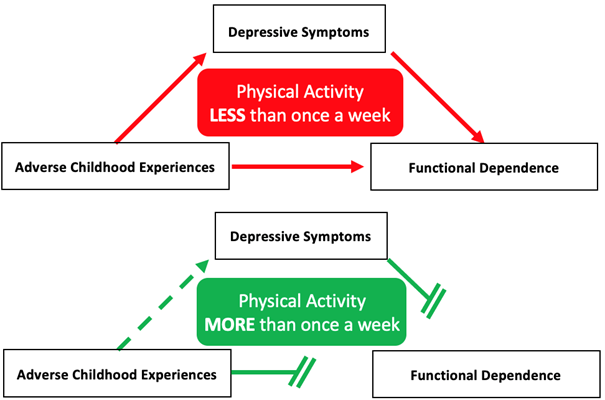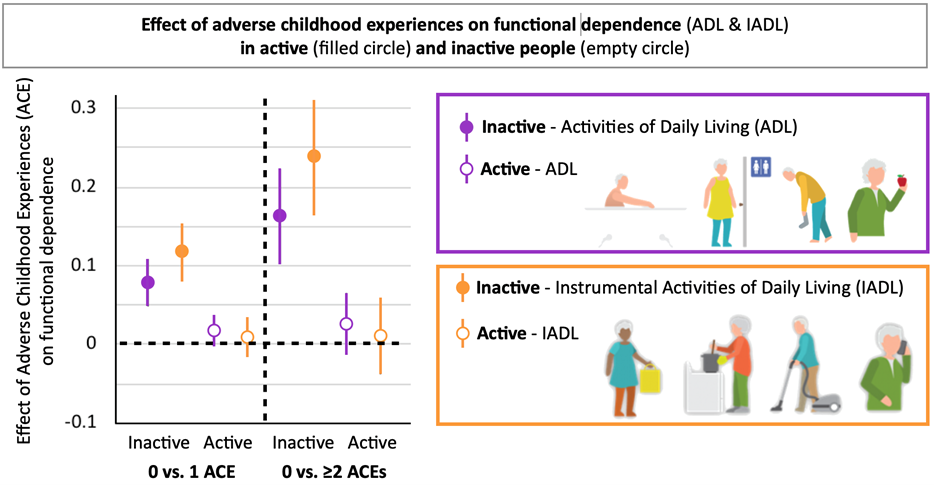Adverse childhood experiences, such as neglect and household dysfunction, can deteriorate numerous health outcomes. Investigating the nature of these effects by determining whether they are direct or explained by an intermediary variable is essential to find ways to attenuate or eliminate them.
Functional independence extends life expectancy
Functional dependence is one of the health outcomes that has been associated with adverse childhood experiences and is typically assessed through performance in activities of daily living (ADL) and instrumental activities of daily living (IADL) with ADL referring to more basic activities (e.g., walking, eating, bathing) than IADL (e.g., shopping, preparing meal, housekeeping). Older adults who perform these activities without limitations have life expectancies 5 years longer than those with functional limitations and are more satisfied with their life.
Depression and adverse childhood experiences have been linked to functional dependence
Depression, a mood disorder that causes a persistent feeling of sadness and loss of interest, may be critical in understanding the relations between adverse childhood experiences and functional dependence in old age. Indeed, stressful experiences, such as adverse childhood experiences, increase the odds of depression. Additionally, studies have shown that depression and functional dependence are associated. While the mechanisms underlying this association are still poorly understood, they could lie in the main symptom of depression, the “lack of interest to all or most things”, which can potentially decrease the frequency an individual engages in activities of daily living (ADL and IADL). In the long term, this decreased frequency could impact the ability to perform these activities, especially in aging, by further increasing the age-related decline of movement control such as postural balance and bimanual coordination. In sum, when considered as a whole, data from different studies suggest that depressive symptoms could be the connector between adverse childhood experiences on functional dependence, which has recently been formally tested study published in the Journal of Physical Activity and Health (Boisgontier et al., 2020) (Figure 1).

Physical activity as a potential protector of functional dependence
In addition, this study investigated whether a physical activity could attenuate the associations between adverse childhood experiences, depressive symptoms, and functional dependence. Physical activity is considered a very promising protective factor because previous studies had shown associations with all three variables under investigation. Specifically, previous results showed that physical activity reduces the risk of developing depressive symptoms, attenuates the association between adverse childhood experiences and depression, and decreases functional dependence. Moreover, physical activity is a low-cost and safe factor that has shown to benefit healthy aging, which further supported the necessity to test its protective effect.
The Survey of Health, Ageing and Retirement in Europe (SHARE)
This study used the Survey of Health, Ageing and Retirement in Europe (SHARE) to collect data of 25,775 adults aged 50 to 96 years from 14 European countries. Functional dependence in ADL and IADL, depressive symptoms, and physical activity were assessed at the first, second, fourth, fifth, and sixth waves. Retrospective adverse childhood experiences were assessed at the third wave.
Depression is the connector, physical activity is the protector
Findings of the study consistently showed the same pattern of results based on statistical analyses suited to examine, for the first time, the mechanism linking adverse childhood experiences, depressive symptoms, functional dependence, and physical activity. Specifically, this study uncovered three main findings. First, depressive symptoms are a “connector” that mediates the effect of adverse childhood experiences on older-adults’ functional dependence in both ADL and IADL. Second, physical activity reduces i) the effect of adverse childhood experiences on depressive symptoms, ii) the effect of depressive symptoms on functional dependence, and iii) the effect of adverse childhood experiences on functional dependence (Figure 1 and 2). Third, in physically active individuals, adverse childhood experiences were not associated with functional dependence, thereby demonstrating that, after age 50, engaging in physical activity more than once a week protects functional independence from the detrimental effects of adverse childhood experiences and depression. In other words, physical activity can weaken or even delete the detrimental effect of adverse childhood experiences on an important aspect of physical and mental health: the ability to independently manage the most important daily activities.

Implications
Public policies aiming to improve functional dependence in older adults should not only focus on physical factors (e.g., muscle strength, joint range of motion, cardiovascular fitness). Psychological factors, such as depressive symptoms, deserve as much focus as the physical factors as they are as likely to increase functional dependence. These policies should also further promote the engagement in physical activity over the lifespan, as even an engagement as low as one day per week can have significant effects on life expectancy and well-being of older adults through a prolonged functional independence.
About the authors:

Matthieu Boisgontier

Stéphane Cullati

Boris Cheval
The article is based on:
Boisgontier MP, Orsholits D, von Arx M, Sieber S, Miller MW, Courvoisier DS, Iversen MD, Cullati S, Cheval B. Adverse childhood experiences, depressive symptoms, functional dependence, and physical activity: A moderated mediation model. Journal of Physical Activity & Health. 2020;17:790-799. https://doi.org/10.1123/jpah.2019-0133
Image source:
RitaE/Pixabay, https://pixabay.com/photos/man-senior-old-man-grandfather-2555188/











Leave A Comment